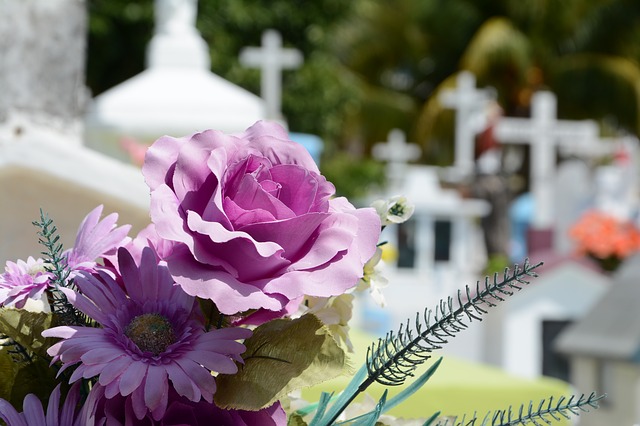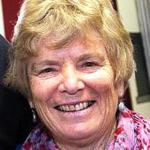
It’s been said there’s nothing more certain in life than death and taxes. We have to face taxes – we pay GST when we buy something, we pay some form of income tax when we earn money – and so it goes on. Taxation is an ever-present reality.
What we don’t face up to is death. We use phrases such as ‘passing away’ when referring to death. Or we make jokes about ‘kicking the bucket.‘ We skirt around the issue – as with the growing interest in ‘zombies,’ the so-called ‘walking dead.’ They are not actually dead, are they? Just humans wearing grotesque make-up.
After her husband died, one woman said, “I never realised death could be so final.” And that is what sticks in the craw. A loved one has totally gone. Forever.
Glossing over death
Our society’s approach to death obscures that reality. A secular funeral will focus on the celebration of a person’s life. There’s a photo presentation, and many and varied tributes, often accompanied by laughter as the foibles of the loved one are remembered. There may be poems, songs that the dead person loved, tears, and special moments. People wear colours, let balloons or butterflies or birds fly free, and reminisce about the departed. The person’s ethnic heritage may be celebrated too.
But is that all?
Celebrate – and find hope
One minister commented to me, “At a funeral it’s important to do two things: celebrate the person, and give people hope.”
Secular celebrations often do a fine job remembering the person. But they have nothing to offer in the way of hope. Death is obviously there – usually the casket is in the midst of the occasion as a constant reminder. But it’s often covered with flowers and memorabilia symbolic of the person’s life.
People greet each other and enjoy food and drink together after the casket has been taken away. Sometimes that’s the most practical thing to do, but it removes people from being involved with the actual burial or cremation.
(And even cremation is glossed over – the button is pressed, the doors or curtains slide open, the casket moves forward, the doors or curtains close again – and no human hand is involved. It’s a sanitised – and somewhat spooky handling of death.)
Hands-on with death
When my mother-in-law was buried, one of the pall-bearers commented, “It was really helpful to actually do the lowering of the casket into the ground, to commit her body into the grave.” Human involvement is common in non-Western cultures, but has become rare in our own.
(Though there is a counter-trend. For the sake of the environment some people are opting for natural caskets and burials, and a more hands-on involvement. Others want to have the body at home for a period of time in order to say their farewells.)
But however a funeral is handled none of these things provide any hope or assurance that the person’s life matters or continues beyond the short time he/she was here on earth.
Where are they?
“Where is she now?” one anguished cousin asked me after her mother died. As a young student I couldn’t give her any answer. “Where has he gone?” asked my young niece with her family gathered around after her father died suddenly. No one could give her any answer either.
Some people seek a shred of hope in the thought that the dead person is ‘looking down on us’ or is one of the stars in the sky, or an angel, or is present in the wind – or whatever it may be. Or they say the dead live on in the memories of those who loved them.
Is this life all there is?
For a total materialist hope is not an issue. Death is the end of existence, and that’s that. Life is to be lived while we are here. How many of us though are total materialists? Many are agnostic – they would like there to be more to life than what we have on earth, but aren’t sure. And for others, going on with day to day life and enjoying what life brings is sufficient, without really facing up to their own– and others’ – mortality.
A sign of hope
A Christian funeral, handled in a sensitive and appropriate way, can point people with no belief to the possibility that there is more to life than what we know here on earth. And the way in which those with faith handle the death of those close to them can also be a sign of hope to others. One couple I know were so impressed with the way in which one woman handled the sudden death of her husband that they too sought faith – and found it.
A friend of ours has now been told that he has just months to live. For himself he says the prospect of death is a source of joy – at last he will be with the One whom he has served so faithfully all his life. For his wife and family, he has concerns – and also that he might have time to complete what he knows God has called him to do. In the face of his own mortality, he knows God’s peace and hope – because he knows where he is going.
Do we see our deaths and those of our loved ones as a ‘dead end’ – or as a gateway to new life? Let’s remember the words of Jesus to his followers, “In my father’s house there are many rooms – and I go to prepare a place for you…” We can find hope there – but will others?

Liz Hay is rejoicing in the gift of new life – with two new grandchildren having arrived in recent weeks, each one precious and unique. She knows that God’s purposes for them does not only include however long they have on this earth, but extends beyond the grave into a fullness of life that’s beyond human imagining.

Liz Hay rejoices in living in a beautiful part of God’s creation in a high country mountain basin; and she also rejoices in hearing stories of God at work in people’s lives. One of her favourite activities is reading fascinating biographies that illustrate the wonderful ways God works uniquely with each person.